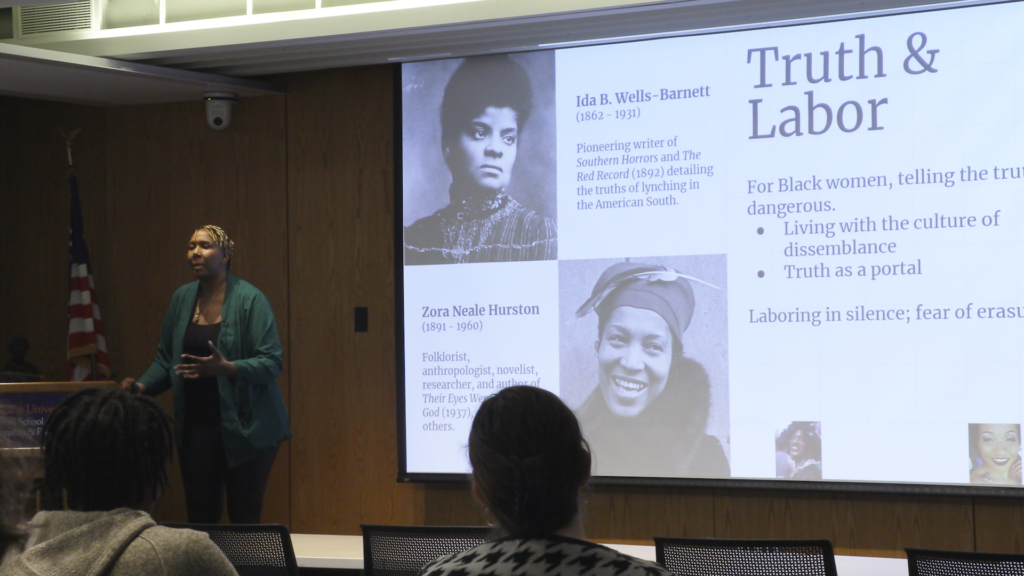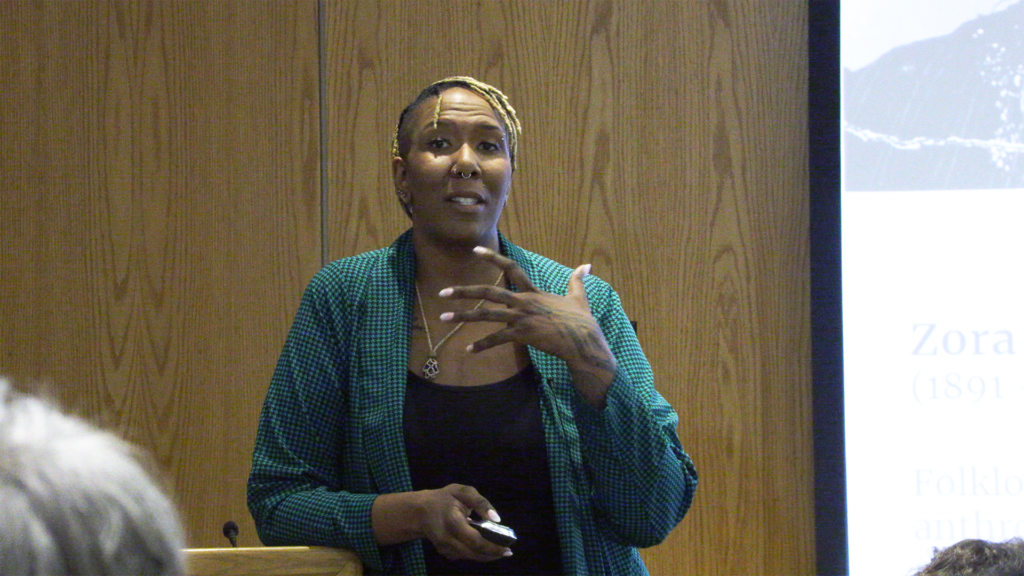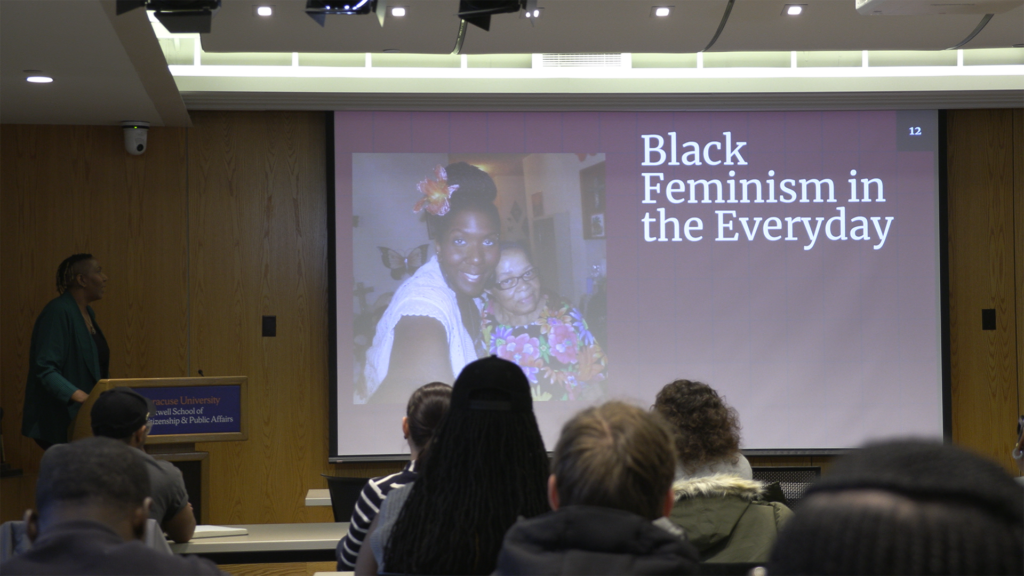Syracuse, N.Y. (NCC News) – Syracuse University is hosting multiple African American speakers in commemoration of Black History Month, including Assistant Professor Jenn Jackson, author of “Black Women Taught Us.”
Transcript
NARRATOR: JENN JACKSON HAD AN UNCONVENTIONAL CAREER PATH TO BECOMING A POLITICAL SCIENTIST AND A PROFESSOR AT SYRACUSE UNIVERSITY.
JACKSON: “I WORKED IN DISNEYLAND IN ANAHEIM FOR A NUMBER OF YEARS, BECAUSE I HAD AN ENGINEERING BACKGROUND..”
NARRATOR: BEFORE JACKSON GOT HERE PRESENTING TO A CROWD OF STUDENTS AND PROFESSORS
SHE GREW UP IN OAKLAND, CALIFORNIA TO A SINGLE MOTHER AND HER GRANDMOTHER.
AT 17 YEARS OLD JACKSON BECAME HOMELESS AND JOINED A PROGRAM CALLED SUMMER SEARCH.
THE PROGRAM WOULD SEND HER 2,800 MILES AWAY FROM HOME TO STUDY ARCHITECTURE.
THIS WAS THE FIRST TIME JACKSON WOULD STEP FOOT ON SYRACUSE UNIVERSITY.
JACKSON: “I LAUGHED ABOUT THIS BECAUSE WE USED TO SIT OUTSIDE ON THE GRASS RIGHT BY THE LINCOLN STATUE…I GOT HERE AND I JUST STARTED CRYING WHEN I SAW THAT STATUE BECAUSE I REMEMBER, OH MY GOSH, THIS IS WHERE I WAS WHEN I WAS 17 YEARS OLD. “
NARRATOR: DUE TO A HEART CONDITION, JACKSON WOULDN’T BE ABLE TO PLAY SPORTS IN COLLEGE.
INSTEAD SHE WOULD ENROLL AT THE UNIVERSITY OF SOUTHERN CALIFORNIA AND EARN HER BACHELOR’S DEGREE IN INDUSTRIAL ENGINEERING.
HOWEVER HER EXPERIENCE IN THE ENGINEERING FIELD WAS NOT WHAT SHE EXPECTED.
JACKSON:
“BUT I ENCOUNTERED A LOT OF RACISM, A LOT OF RACISM, AND, THAT. ENCOURAGED ME TO GO BACK TO SCHOOL. SO I WENT AND GOT A POLI-SCI AND THAT’S WHAT I DISCOVERED. SO THIS IS WHAT I WANT TO DO WITH MY LIFE.”
NARRATOR: AFTER GETTING HER DOCTORATE FROM THE UNIVERSITY OF CHICAGO SHE BEGAN HER FIRST ACADEMIC BOOK PROJECT “POLICING BLACKNESS”
HER UPBRINGING IN OAKLAND WOULD FUEL HER PASSION FOR POLITICAL SCIENCE.
JACKSON: “I WANT PEOPLE TO UNDERSTAND THAT I DIDN’T COME FROM SOME WEALTHY FAMILY. I CAME FROM OAKLAND. I CAME FROM A REGULAR SPEAKER HOUSEHOLD. YOU KNOW, I WAS RAISED BY BLACK WOMEN WHO MADE SOFT PORK AND TOP RAMEN”
NARRATOR: FOR JACKSON THE CHAPTER OF HER LIFE THAT HAD THE MOST PIVOTAL ROLE WAS WRITTEN WELL BEFORE THIS BOOK WAS PUBLISHED.
REPORTING FOR NCC NEWS KYE’L TORAIN.
During Jackson’s presentation, she discussed the pivotal roles that Black women have played historically in politics, activism, and feminism.
Her presentation featured prominent figures like Ida B. Wells and Zora Hurston.
“What does it mean to write against annihilation?” Jackson rhetorically asked. “For Ida B. Wells it meant being excluded, it meant being isolated, it meant running away from home. Having to write under a pin name. It meant a threat of being potentially killed by a lynch mob.”

Wells, co-founder of the National Association for the Advancement of Colored People (NAACP), documented and reported on lynchings throughout her time as an investigative journalist and was pivotal in the anti-lynching movement. The first anti-lynching bill that was signed into law was The Emmett Till Antilynching Act on March 29, 2022, which was 91 years and 4 days after the passing of Wells.
Jackson didn’t stop there as she journeyed on to Zora Neale Hurston, asking and then answering the same rhetorical question: “What does it mean to write against annihilation?”
“For Zora Neale Hurston, it meant that she was also excluded from her community. It meant that people like Richard Wright and Alain Locke found her work to be meaningless. They found that her work, actually in their opinion, made a bad portrayal of Black Americans. At the time they said it was, unrespectful. They said it made Black Americans look like fools.”
Jackson emphasized that this was “because she would often categorize and write about Black Americans in their own dialect.”
Hurston, a folklorist, anthropologist, and novelist, was best known for her novel “Their Eyes Were Watching God,” published in 1937 during the Harlem Renaissance. But it was her biography “Barracoon: The Story of the Last Black Cargo” that went unpublished and was scrutinized due to the dialect presented in the non-fiction work.

“Barracoon: The Story of the Last Black Cargo” would later be published in 2018. Publishing what is thought to be the last stories and memories of the last- known survivor of the Atlantic Slave Trade.
Throughout the presentation, Jackson detailed the pivotal role Black women have in social justice and feminism. They include Pulitzer Prize winner Toni Morrison, civil rights activist Ella Baker, voting and civil rights activist Fannie Lou Hamer, the first Black Congresswoman Shirley Chisholm, feminist political leader Angela Y. Davis and civil rights activist Audree Lorde.
Near the end of the presentation, Jackson read from a section in her book before standing back behind the podium.
“I read that to introduce you to my grandmother,” said Jackson, fully displaying a picture of her grandmother in front of the room. “This is my grandmother Lucille. She passed away in 2021. She was the light of my life.”

Jackson said her grandmother was a driving force in her life.
“So, the reason why my grandmother played such a pivotal role, in the presentation, and also in the book is because she was one of the first places I learned about who I was – about my Black feminism, about what Black womanhood was,” said Jackson. “When I think about my grandmother’s Black feminism, she was so invested in my survival. She was so invested in giving me lessons about how to navigate the anti-Blackness, white world.”

